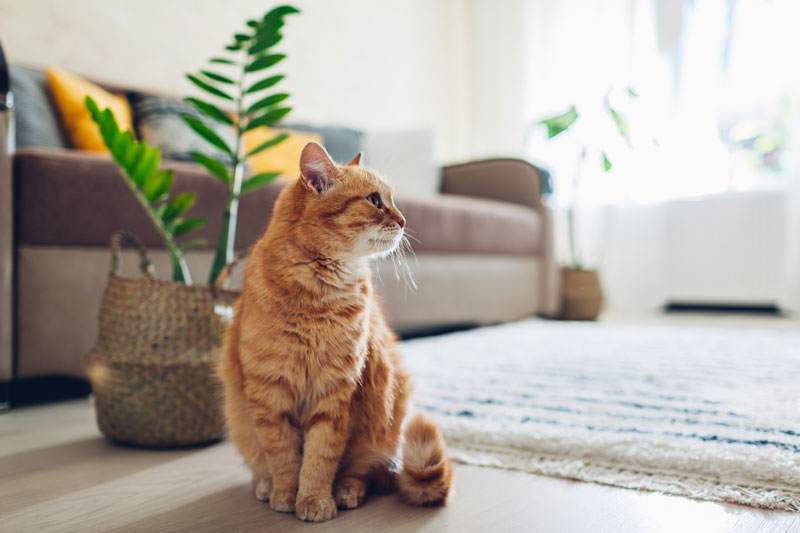Forget what you heard about essential oil use on pets. Unless of course if it was that they can do wonders. In that case, this article will only confirm what you’ve heard.
Yes, animals are smaller than humans so diluting essential oils is important. But according to countless holistic veterinarian’s extensive research, essential oils bad reputation is undeserved.
Today, we’re specifically talking cats and are essential oils safe for cats. Spoiler, they are. So, if you’ve got a furry little sassy girl or guy at home, this article is for you. Our pets are like our children. We spoil them. We love them unconditionally. And will do anything to make sure they are mentally and physically healthy.
In this article, we will talk about the benefits of essential oils for cats (from practicing veterinarian’s themselves), which essential oils to use, how to use them, and amazing DIY recipes you and your BFF will love.
Essential Oils and Cats Controversy
Cats (and dogs!) have unique concerns and requirements when it comes to essential oils. If you own a cat, you probably agree that cats have distinct views of the world and when it comes to aromatherapy this holds true. Even before dogs, essential oils and cats are the most controversial topic when it comes to essential oil use and animals.
If you have concerns about using essential oils on your cat, that is rightly so. According to holistic veterinarian Dr. Melissa Shelton of animalEO, most veterinarians that are cautious and have never used essential oils themselves. Her biggest concern is that essential oils associated with killing cats have not been truly evaluated and proved to be the cause.
For instance, tea tree essential oil or melaleuca essential oil is one of the biggest controversies. Some people have exposed their cat to a cheap and poor grade of tea tree oil which resulted in seizures and death. On the other hand, Dr. Shelton has orally given 4 drops of tea tree oil twice a day followed with blood work and never found illness or saw ill events.
Harming your cat is a sound concern but in this article we’re going to show you how to properly search out and use essential oils that are safe for your cat. But as always, after conducting your research always consult with your holistic veterinarian before use.
Are Essential Oils Safe for Cats?
Dr. Melissa Shelton, a holistic DMV, founder of AnimalEO and pioneer in the use of essential oils to treat animals, discovered that blood work abnormalities she was seeing in pets we’re due to exposure of conventional air fresheners. If you know us here at elevays.com, you know that we are 100% against air fresheners due to the thousands of known carcinogens and endocrine disruptors they are created with. After Dr. Shelton suggested the removal of air fresheners from her pet patient’s home, she saw blood work values return to normal!
Before this amazing discovery, Dr. Shelton had replaced her home and clinic’s air fresheners with essential oils. She attended a community education class for natural remedies where she fell in love with using essential oils. She was also able to cure her husband’s seemingly never-ever-going-to-go-away-EVER wart with essential oils.
Dr. Shelton’s Investigation
It was then when Dr. Shelton began investigating the safety of essential oil use in her vet clinic.
At first, Dr. Shelton was extremely cautious about using essential oils for her own cat at home. She would receive calls from others in the veterinary industry asking “How dare you even recommend that you could use essential oils for cats?!”
So, in the beginning, Dr. Shelton would leave the diffuser on at her house and avoided topical essential oils use for cats. She noticed that her cat spent a lot of time lying l next to the diffuser where she also delivered her litter of cats. Dr. Shelton thought that her cat was smart and that she knew how her body responded to the essential oils better than anyone else. As she continued to monitor her cat’s blood and urine she was excited to see no abnormalities.
But here is the thing, many people who are on the essential oil bandwagon may love using essential oils for cats and other pets because they are a natural remedy. But they fail to do research, evaluate oils, make sure they are quality and instead they just slap on whatever essential oil for cats or pets that they can. And this is where the problem occurs. Similarly, air fresheners which are full fragrance, junk essential oils are also fragrance grade. Which makes sense why some have found low-grade essential oils to be toxic for cats.
Summary of Findings
In summary, essential oils for cats can be safe- if used correctly! Dr. Shelton knows thousands of people who use essential oils for cats and pets successfully, and only a handful that have had a problem. The main problem being potency, purity, and quality. If you are using crappy, cheap, and junky essential oils for cats then that’s not going to have the therapeutic and aromatic benefits we are looking for. Just the same as humans.
Essential Oils and Cats Success Story
Cowboy the cat had upper motor neuron damage to his bladder and couldn’t urinate. His bladder was the size of a cantaloupe and he was hospitalized over and over again. Nothing Dr. Shelton turned to worked and Cowboy’s mom told her to do anything she had to. Dr. Shelton suggested trying essential oils and after his owner agreed, Cowboy’s bloodwork turned from horrible to incredible, and he was able to urinate on his own. Since using essential oils, Cowboy has not been hospitalized since.
For Cowboy’s mom, a natural remedy and non-invasive therapy was a huge sigh of relief for her.
How to Get Started with Essential Oils and Cats
Below are some tips and guidelines that will help you get started with essential oils for your cat.
1. Find Quality Essential Oils
As with anyone looking to get started with essential oils, quality is number one. Just as you wouldn’t buy a cheap oil for yourself, you must purchase high-quality, pure, medical-grade essential oils for your cat.
Just because a company says they are high-quality, doesn’t necessarily mean they are. Check out Dr. Shelton’s website www.oilyvet.com where you can find brands she supports. Below I will have a list of essential oils that are safe for your cat and a link to purchase.
2. Educate Yourself on Proper Handling
Oily Vet has amazing resources that will help you understand which essential oils are safe for cats, what they work for, and how to use them. Don’t just grab any old essential oil in your collection and apply. You need to know which essential oil, what you want to treat, how to dilute, and where to apply.
This may seem like a no-brainer but you don’t want to risk harming your cat. I would recommend applying the oil to yourself before administering it to your cat. Then after approving and giving it to your cat, MONITOR. MONITOR. MONITOR.
3. Know Your Cat
Just like us humans, animals prefer certain aromas over others. Experiment with various oils (after understanding proper handling) to see how your furry friend responds to the aroma and benefit of the essential oil.
If your cat is avoiding the diffuser or oil smell at all costs, it’s probably not right for them. So when diffusing, allow your cat to freely room so you can see if your cat is expressing anxiety, drooling, or tremors.
4. Consult With A Vet That is Familiar with Essential Oils and Cats
Contacting a vet that is experienced with oils allows you to get accurate advice and trustworthy guidance so you know essential oils are safe for cats.
Safe Essential Oils for Cats
Below is a list of cat approved essential oils according to AnimalEO. Remember to only purchase high quality essential oils for your cat and to research proper handling before application.
- Anise: digestive concerns
- Balsam Fir: bone and respiratory issues
- Basil: antispasmodic, anti-inflammatory, aids in blood flow
- Catnip: anti-bug
- Cilantro: toxic cleansing properties
- Clove: antibacterial, antiviral, antifungal, antiseptic, anti-parasitic
- Copaiba: used in clinics to replace anti-inflammatory medications, chronic arthritis medications, urinary incontinence and more
- Cypress: lymph drainage, nervous system support
- Dill Weed: beneficial effects for diabetes, insulin and blood sugar regulation, pancreatic conditions
- Frankincense: joint pain
- Geranium: skin conditions
- Ginger: nausea, vomiting
- Lavender: calming properties
- Lemon: cleansing, antibacterial, antiviral
- Melissa: antihistamine, anti-viral, life force, energy, uplifting, emotional balancing
- Myrrh: thyroid system, skin
- Myrtle: supports liver, prostate, thyroid, respiratory conditions
- Palmarosa: skin conditions
- Roman Chamomile: calming abilities, antispasmodic, anti-inflammatory, and anti-parasitic
- Saro: uplifting, viral, bacterial, fungal, anti-inflammatory properties
- Tangerine: spasm, tumors and cancer, digestive problems, liver problems, parasites, fluid retention, edema, anxiety, obesity, circulation disorders, and depression
- Vetiver: calming, insomnia
Benefits of Essential Oils and Cats
Essential oils have the incredible power to work at cognitive, emotional, and physiological levels. The effects of essential oils on cats work at the cellular level and foster positive effects on neurochemistry and biochemistry. Essential oils and cats can offer a holistic approach to healing mind, body, and spirit. Here are a few of the amazing benefits we see with animals.
If your cat does not have a serious condition but you’re interested in getting started with essential oils to help calm and comfort, try these recipes. If your cat has a serious medical condition check out which essential oils can be beneficial and consult with your vet.
Stress Relief
Animals including cats can experience sadness, depression, and anxiety. Lavender essential oil is one of the best essential oils for stress relief. Wildlife rehabilitator Dr. Karen Becker apprenticed under a woman who would put a few drops of very pure pharmaceutical grade lavender essential oil on a cotton ball and tape it outside of their cages. They saw an immediate overall calming effect.
Stress Relief Essential Oils and Cats DIY Recipe
- To calm help calm and relax your cat apply 2-3 drops of lavender essential oil to ears and paws
- Diffuse lavender essential oil in home in water based diffuser
Joint Pain Relief
Cats live for a long, long time. And just as we get older and begin to experience joint pain, so do cats. There is nothing worse than seeing your baby in discomfort and not knowing what to do. Essential oils can act as a wonderful natural remedy for helping your cat with joint pain relief.
Joint Pain Relief Essential Oils and Cats DIY Recipe
- Rub frankincense directly on joints
Essential Oils and Cats DIY Recipes for You
No-Odor Kitty Litter
We love our kitties but good gosh does their litter box stink! Use this recipe to keep it fresh all day, everyday.
Ingredients:
- 4 cups baking soda
- 15 drops lemon essential oil
- 5 drops bergamot, thyme, or lavender *optional*
Instructions:
- Combine in a large bowl and sprinkle 2 tablespoons onto kitty litter when cleaning box daily
Cat Scratch Deterrent
We love our cats but hate when they pull at our sofa and rugs. Spray this DIY essential oil recipe safe for cats wherever you don’t want your furry friend to scratch.
Ingredients:
- 10 drops eucalyptus essential oil
- 10 drops lemon essential oil
- 1 cup water
Instructions:
- Combine oils in empty spray bottle
- Add water & shake
- Spray on areas you do not want your cat to scratch
Flea Collar Repellent
Don’t let your kitty get attacked! Make this DIY essential oil recipe safe for cats to protect yours.
Ingredients:
- ½ teaspoon rubbing alcohol
- 4 garlic oil capsule
- 1 drop cedarwood essential oil
- 1 drop lavender essential oil
- 1 drop lemon essential oil
- 1 drop thyme essential oil
Instructions:
- Mix in a medium bowl
- Soak collar in mixture for 25-30 minutes
- Lay out to dry
- Place on pet’s neck
- Repeat once or twice a month
I hope this article has helped clear up some controversy around essential oils and cats. It’s important to remember that essential oils are potent and should be used cautiously whenever used, not just on your pets.
Now I want to hear from you. Have you ever tried essential oils on your cat? What we’re your experiences? Have you experienced a vet that was for or against the use of essential oils on cats? Let me know in the comments below, I would love to hear from you!
Sources:









Hi Dr. Shelton! This article was a great read. I just recently bought an essential oil roll-on containing lavender, cedarwood, capric triglyceride, roman chamomile, and coconut oil for self topical use. Although I don’t plan on using this on my cat, I am curious as to whether this oil is safe for my cat if he comes into contact with it. Thanks!
Hi Allie! The oils you have listed are on the safe list, except for cedarwood – it’s typically too strong of a scent (they dislike the smell) and not properly sourced or diluted (although you’re not using it topically on your cat, we wanted to mention this regardless). We advise what Dr. Shelton does, monitor your cat, know your cat, and consult with a Vet who is experienced with essential oils for pets.